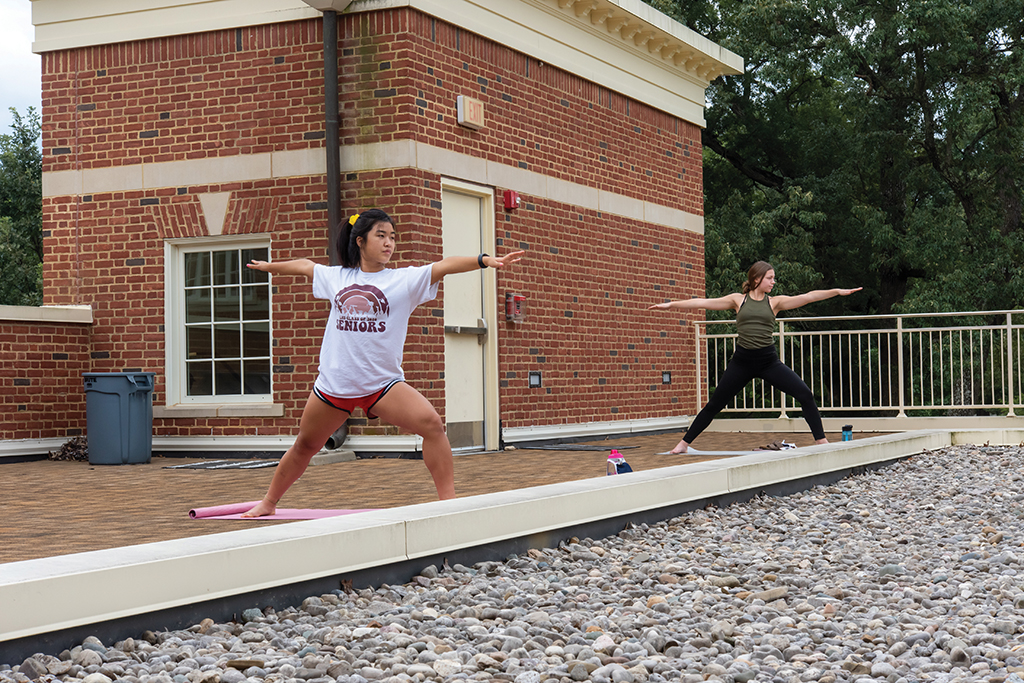“Students who come to Berea College are offered many blessings and opportunities,” said Corey Carroll, a senior economics and business management major from College Station, Texas. “But often they don’t know how to cope with the changes college brings.”
Carroll has learned that one way to cope is through practicing mindfulness. As a student in Dr. Penelope Wong’s Adolescent Development class his sophomore year, he engaged regularly in a “mindful moment” to begin class—taking a minute to breathe silently, bringing awareness to the present. “Mindfulness is an important skill for teachers,” said Wong, associate professor of Education Studies. “Students who are stressed are not capable of taking in information.”
Beginning class with a mindful moment works to relax students, Wong says. Dr. Leslie Ortquist-Ahrens agreed. Ortquist-Ahrens, who directs the Center for Teaching and Learning, often begins her classes in English, General Studies and faculty-student partnerships with a mindful minute. “It helps students to land in that space,” she said.
Mindful moments can be used outside class as well, Carroll points out. “You can do them all through your day to clear your mind,” he said. “They can help you to check in with yourself, to manage your emotions.”
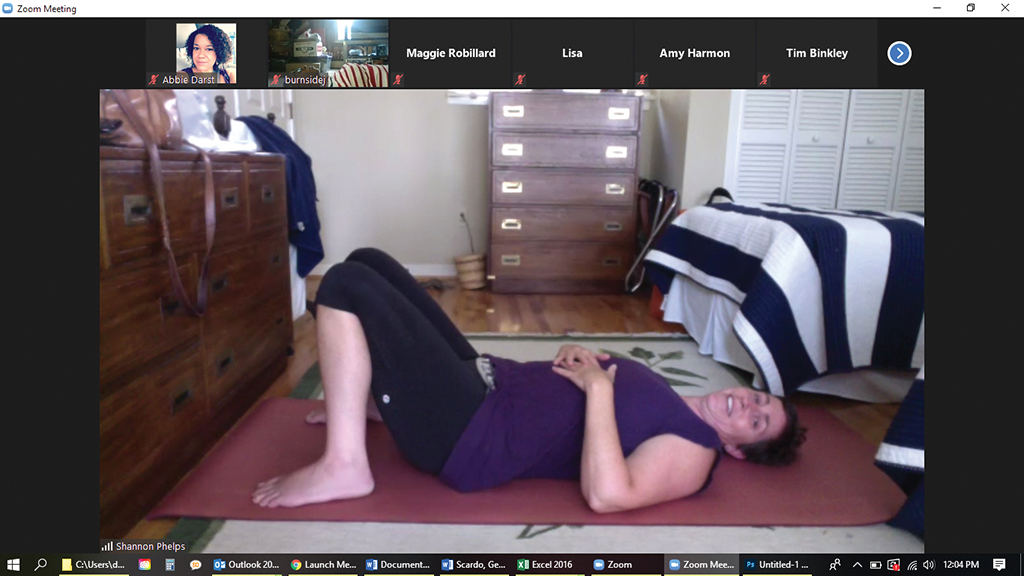
Dr. Shannon Phelps, assistant professor of Health and Human Performance (HHP), invites a mindful moment during class when she senses students need to be more engaged. “Their body language shows they appreciate these moments,” she said. “They sit more upright.”
Jill Gurtatowski, director of Health and Wellness, has also seen students respond positively to the mindful moments she offers in her wellness classes. “Being still is very powerful for students,” she says. “They appreciate the permission to declutter their minds.”
Mindful moments can build into a meditation practice, some students and faculty have found. In her senior year, Palkyi Palkyi, ’20, began inviting friends to join her in a weekly short meditation, usually outdoors. “So many things distracted me,” Palkyi said. “Meditation is useful in controlling the mind, focusing on one thing, becoming aware of your thoughts.” Meditating in nature, she said, brings her peace of mind. “It helps me slow down,” she said. “When I’m stressed, I can feel my heart beat faster. Meditation helps me not to feel so anxious.” As a nursing major, Palkyi also saw opportunities to use mindfulness techniques to give patients a non-pharmacological way to control pain.
Though Palkyi learned mindfulness techniques in her home country, Tibet, before coming to Berea, other students have learned them through taking Koru, a four-week non-credit class offered on campus since 2015. Koru was developed at Duke University’s Counselling Services as a compressed course in the mindfulness-based stress reduction program created by psychologist Jon Kabat-Zinn. In each of four 75-minute sessions, students learn about and practice two different mindfulness techniques.
Koru at Berea
Koru was brought to Berea in 2014 by Dr. Martha Beagle, professor of HHP (retired 2018) as a pilot program with the potential to contribute to dimensions of emotional and spiritual health in Berea’s wellness-focused Quality Enhancement Plan. Support from the Academic Vice President’s office has enabled 10 faculty and staff members to attend workshops and train to lead classes. To be certified, facilitators must complete a weekend session with readings and practice, co-lead three class sessions and submit a portfolio of completed logs, videos and reflections. Certified facilitators must also complete a three-day silent retreat each year.
At Berea, teaching the Koru class is a volunteer activity. “I enjoy doing it,” Wong said. “It gives me a chance to decompress.” Teaching is also a form of giving back, Phelps notes. “Meditation feels like a gift,” she says. “I get to turn around and offer it to others—it’s fulfilling.” Dr. Jeff Richey, professor of Asian Studies, notes the importance of helping students learn to care for themselves. “Is Berea producing whole healthy people who will go into the world making it whole and healthy?” he asked. “Students need this care and will use it. They are hungry for mindfulness.”
Meditation feels like a gift. I get to turn around and offer it to others—it’s fulfilling.
Dr. Shannon Phelps, assistant HHP professor
Through fall 2019, the College offered two or three Koru sessions each term. To date, more than 100 (before fall 2019; will update number) students have completed the program. Last spring, after the College closed to in-person instruction in response to the Covid-19 pandemic, Richey emailed students about the opportunity to enroll in a free online Koru course offered by Duke University. Wong plans to offer a remote class this spring. Entering students in Berea Bridge have also been introduced to elements of Koru. “Koru is an incredible opportunity for students to be exposed to material that if practiced, can profoundly change their lives,” said facilitator Stephanie Woodie, associate professor of HHP.
Dominique Jenkins, ’20, an Asian Studies major from Louisville, said he benefitted from the Koru class. He made use of dynamic breathing—“it wakes you up”—and body scans, to be able to feel an emotion arising and then decide how to respond. “I’ve gotten better at thinking collectedly,” he said. In addition to completing the Koru class, Jenkins studied for a year in Japan. “Mindfulness is embedded in Japanese culture,” he said. Living there and studying Koru at Berea has made him more considerate of others, he notes.
Koru can help students “make friends with their minds,” said Jim Strand, executive administrative assistant to the Academic Vice President. He co-taught his first Koru class in 2019. “Attention to breathing as a way to redirect the mind is a central core piece in Koru,” he said. “You can become more creative if you can move past reacting to responding.”
Leading campus leaders
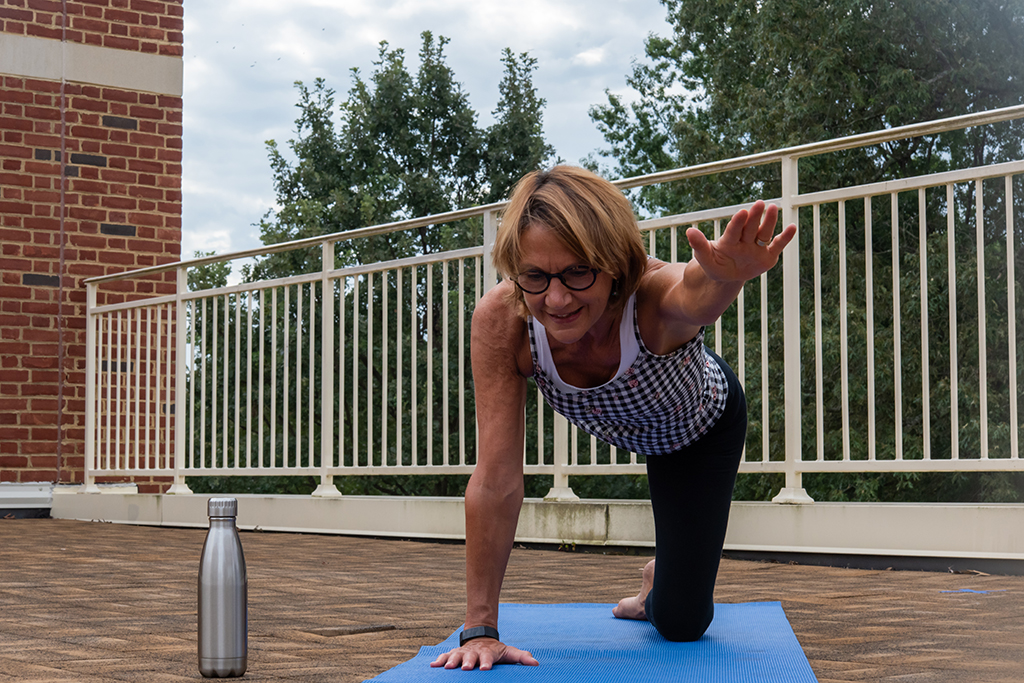
In addition to serving students, mindfulness education has been offered to faculty and staff. A fall 2015 dean’s reading group explored essays on higher education contemplative practices, with discussions continuing into spring 2016. Two faculty-staff Koru classes have been offered, one in spring 2017, led by Phelps and Dr. Sue Reimondo, director of Counseling Services and another last term, led by Richey and Woodie.
“The biggest impact of that class was learning to live in the moment,” said Dr. Mary Robert Garrett, associate professor of organic chemistry, a spring 2017 participant. At work and home, she tells herself that what she’s doing now is the most important thing. She believes that mindfulness has helped increase her patience. “It’s a good skill to have,” she said. “It doesn’t depend on anybody else; you can do it yourself.” As Berea’s coordinator of advising, Garrett hopes to find ways to help advisors see the benefits of mindfulness for themselves and their students. “Mindfulness helps us get out of ruts,” she said. “So many of us need a new lens.”
Koru instructors often incorporate mindfulness approaches into their other classes and work. Phelps teaches mindfulness in wellness and stress management classes. Woodie brings mindfulness to her yoga and wellness classes, including those conducted remotely. Her interest in mindfulness began in the 1990s as she studied for her MFA in dance and continued during her certification as a yoga instructor.
In yoga, a physical activity HHP class, and in Dance in Healing and Therapy, Woodie stresses body awareness. “We live our lives in our bodies, not our heads,” she said. “The body is an important teacher.”
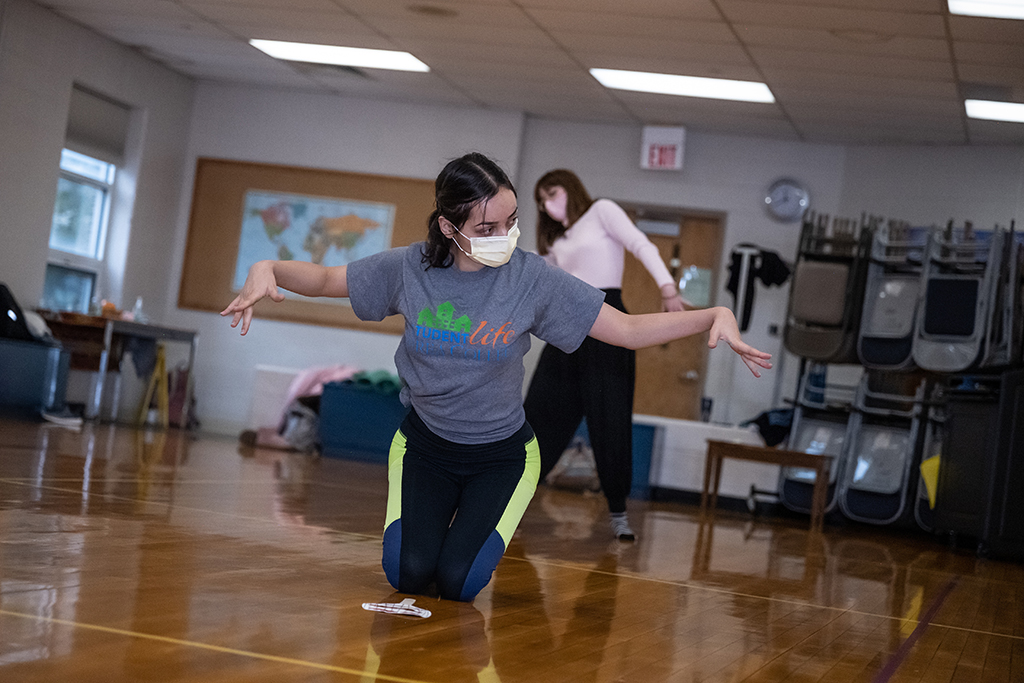

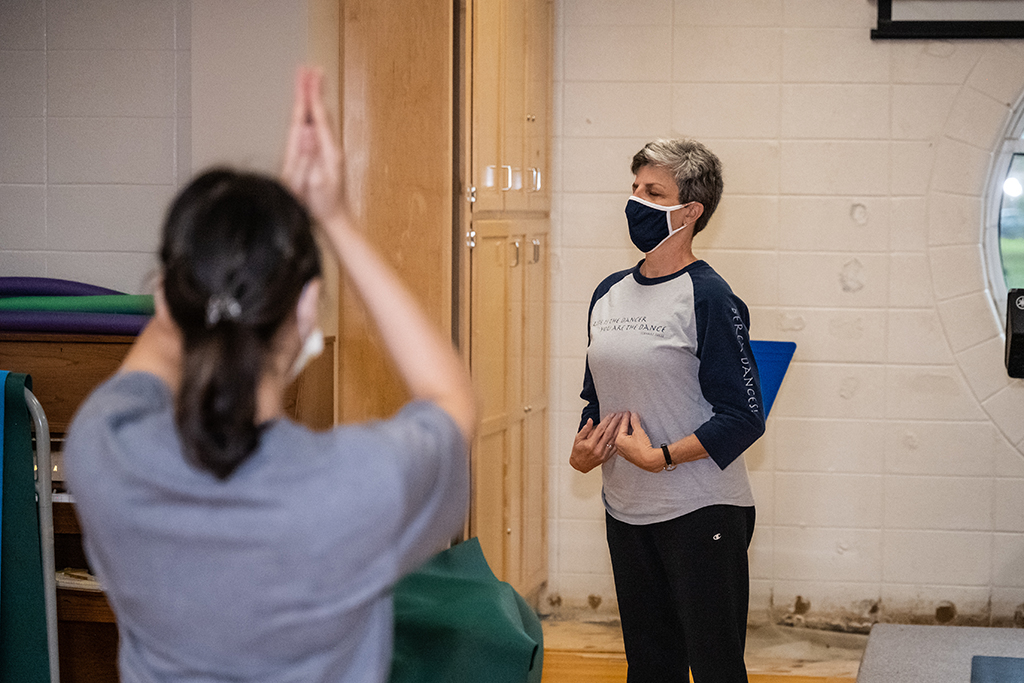
Professor Stephanie Woodie addresses her Dance in Healing and Therapy class. 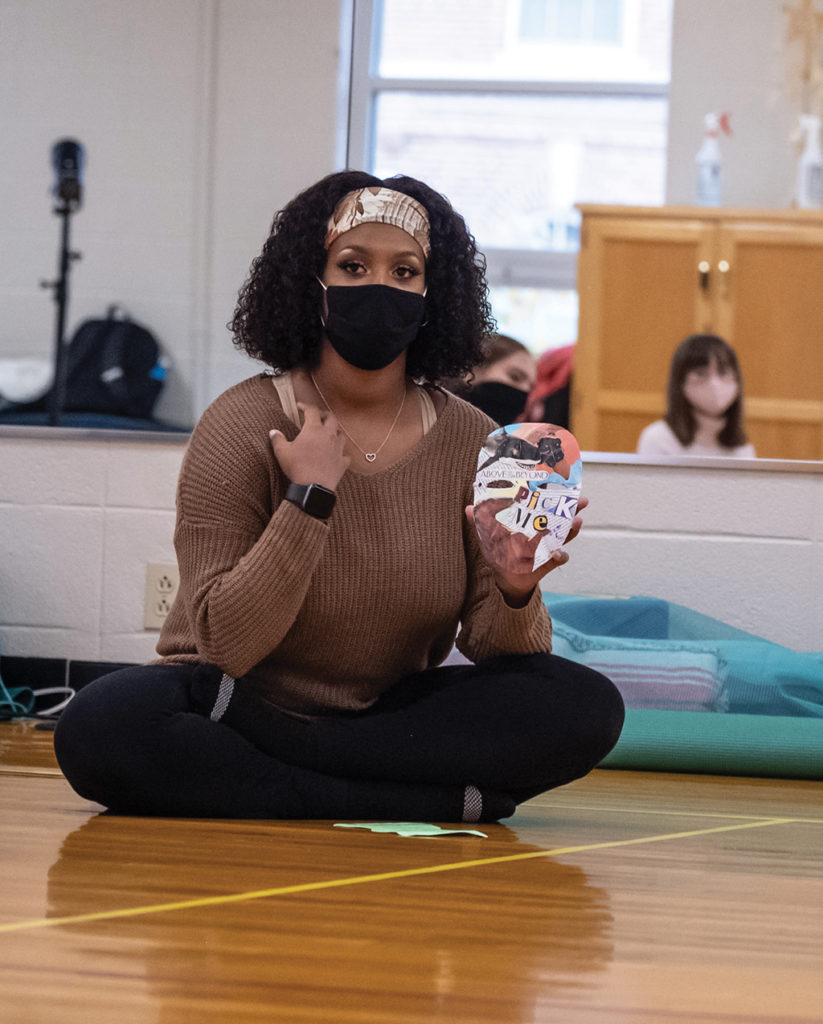
Shania Smith ’22, a student in Professor Stephanie Woodie’s Dance in Healing and Therapy class taught in fall 2020, shares her mask creation with the class for a mask-dance project. 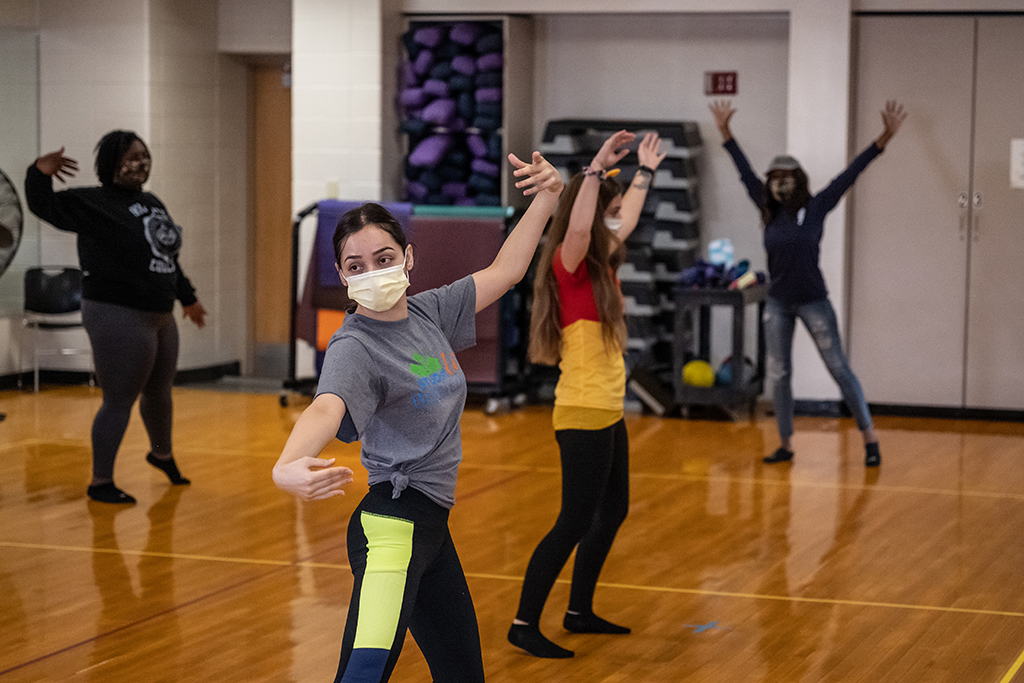
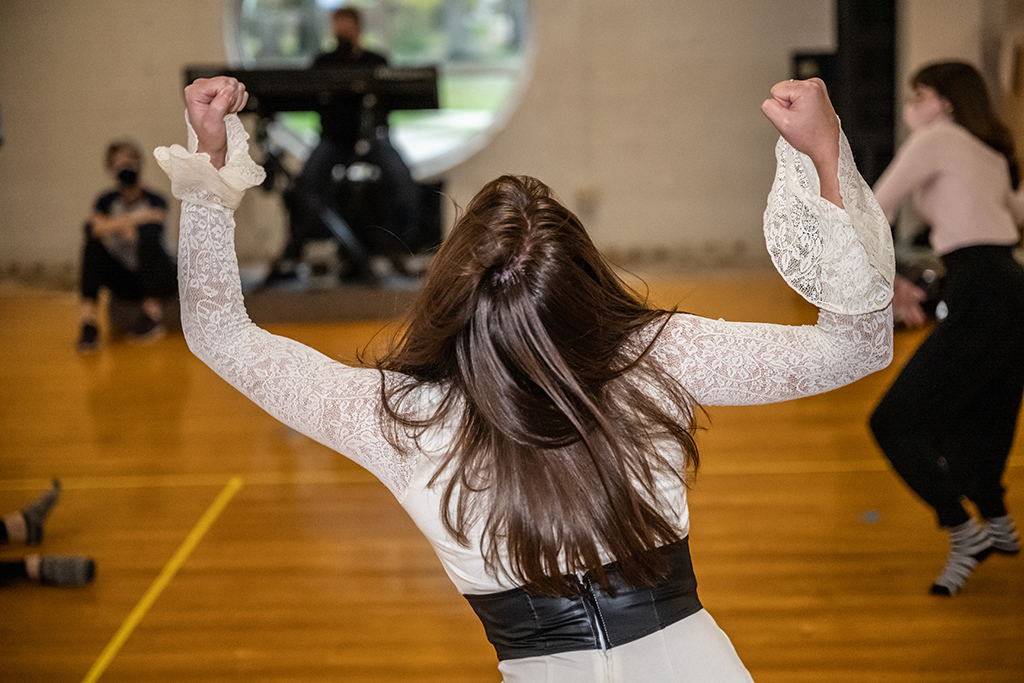
Woodie’s dance therapy class in fall 2018 was an opportunity “to drop into your body,” said Deanna Allen, ’19, a health sciences major from Louisville. “When the mind and body are one, that’s mindfulness.” She planned to draw on this learning in midwifery school.
They need to learn to be OK with not being OK—with being uncertain. It’s a skill that’s important to motional health.
Stephanie Woodie, HHP associate professor
In wellness, Woodie helps students understand the importance of reflection and understanding. “They need to learn to be OK with not being OK, with being uncertain,” she said. “It’s a skill that’s important to emotional health.”
All classes in Berea’s year-long wellness course for first-year students use the mindfulness edition of Rebecca Donatelle’s “My Health,” though instructors are free to choose their class’s emphasis. Chapters in psychological health and stress management include suggestions for mindfulness practices. In fall term, students in all wellness classes were asked to pursue some form of meditation for 30 minutes each week. Gurtatowski encouraged her wellness students to explore journaling, calming music, breathing exercises and guided meditations and visualizations, using materials found on Berea’s Campus Well website. “I was extremely impressed with my students,” Gurtatowski said. “They willingly tried different methods; some they liked, some they did not. My philosophy is that you don’t know until you try.”
Mindfulness approaches are valuable in counseling work, says Reimondo. She believes students need to be taught the importance of pausing. In both therapies in which Reimondo is trained, cognitive behavior therapy and dialectical behavior therapy, mindfulness approaches are included. Both therapies advocate slowing your thoughts and observing without judgment and with compassion, she says. All Counseling Services staffers teach techniques of grounding through breathing. Another Koru technique, meditative walking, is helpful in creating moments of joy, Reimondo says. “Life is made out of ordinary moments—extraordinary if you pay attention,” she said. “Opportunities for joy help us to change the narrative by which we run our lives.”
Other opportunities for mindfulness education occur across the college’s curriculum. Dr. Jarrod Brown, assistant professor of philosophy, focuses his GSTR first-term writing seminar on “thinking about thinking.” When students pay attention to their internal emotional and cognitive states, they can learn to direct their emotions and thoughts, he says. “Meditation helps us to help ourselves,” he said. In teaching classes in Buddhism and Hinduism, he draws on Vipassana meditation, among other traditions, to help students learn to “dispassionately pay attention” to their cognitive states.
Brown’s interest in meditation began when he was 12, when he read E.A. Burtt’s “Teachings of the Compassionate Buddha.” He began practicing meditation in 2001 when, as a Berea College junior, he studied abroad in Malaysia. Meditation’s lesson in impermanence is important to him as a philosopher, he says. “I can love and care for people, have a rich emotional life, without becoming too attached to my emotions,” he said. He believes that his meditation practice has given him a deeper sense of responsibility for his mental and emotional life.
Dr. Jeff Pool, professor of Religion, invites students to explore different approaches to mindfulness and meditation in REL 102, Introduction to the Study of Spirituality. He hopes that understanding varied perspectives will encourage students “to find a spiritual path all day long, wherever they are.” Living in the present is a lesson Pool has learned through his study of Zen Buddhism as well as his work training his horse, Cory Aodhan, an Irish-Spanish mustang. There, Pool makes use of natural horsemanship approaches. “In riding, if you don’t focus on this moment, you will fail,” he says. “Hard times are opportunities to be reborn, to learn from failure.”
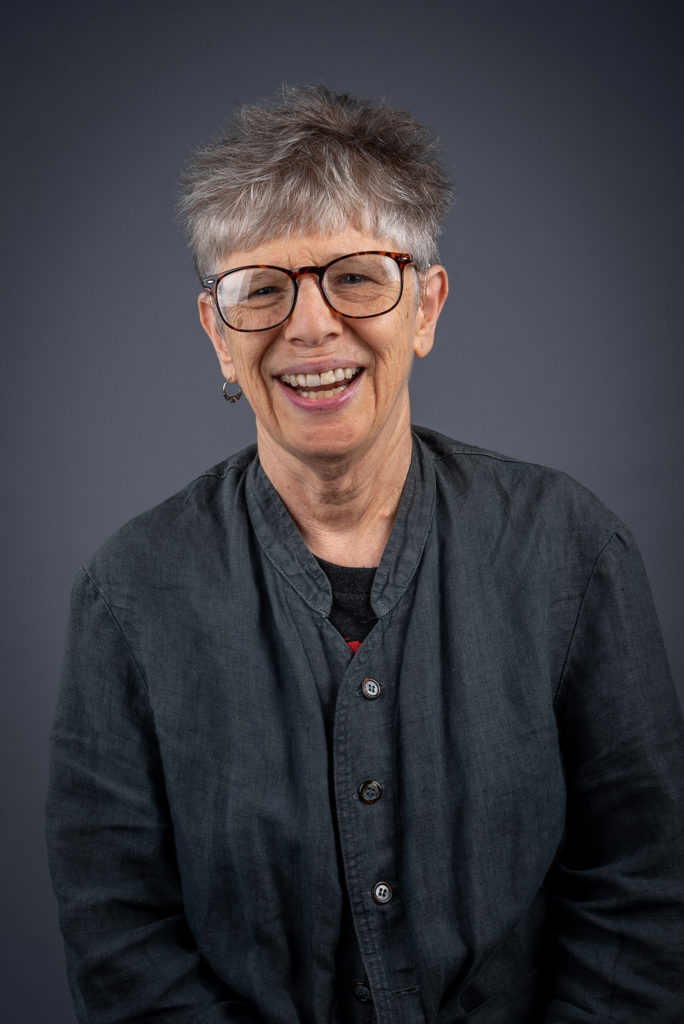
Mindfulness and meditation are also included in the Peace and Social Justice Studies curriculum. In Movements and Community Organization, a course required for the major, students explore mindfulness as a part of self-care. “Social transformation involves personal transformation,” said Dr. Meta Mendel-Reyes, associate professor of PSJ and general studies. “Self-care is necessary to avoid burn-out and to make activism effective.”
Mendel-Reyes’ work builds on that of Dr. Michael Rivage-Seul, professor of general studies and first PSJ program director (retired 2010). At 20, Rivage-Seul began practicing meditation in the tradition of St. Ignatius of Loyola, founder of the Jesuits. In 1998, he began a personal “passage meditation” practice developed by Eknath Easwaran, a Hindu teacher from Kerala, India. At Berea, Rivage-Seul twice taught a January term course in meditation and also included the study of meditation in his sections of Religious and Historical Perspectives, then a required general studies course. In initiating PSJ in 2005, Rivage-Seul sponsored two community one-day meditation retreats, facilitated by teachers from Easwaran’s Blue Mountain Center.
“My idea was that peace-making begins with one’s self,” he said. He notes that in the 10 years since his retirement from Berea, meditation has continued as a central activity of his life.
Berea educators outside the classroom also believe that mindfulness concepts and practices can help students. Marcus Epps, coordinator of student success in the Office of Academic Services, includes suggestions drawn from mindfulness practices in his sessions with students. “Noticing their habits without judgment allows student to rethink their perspective on responsibility, self-care, and agency,” Epps said. “Rather than focusing on past mistakes or unknown future performance, I want students to be present and to keep moving forward.”
Amanda Tudor, director of career development, urges students to approach their futures mindfully, to hear and develop meaningful themes in their lives. “Career development should be a place of reflection and openness,” she said. “We need to ask how our lives have unfolded, to pay attention to our direction.”
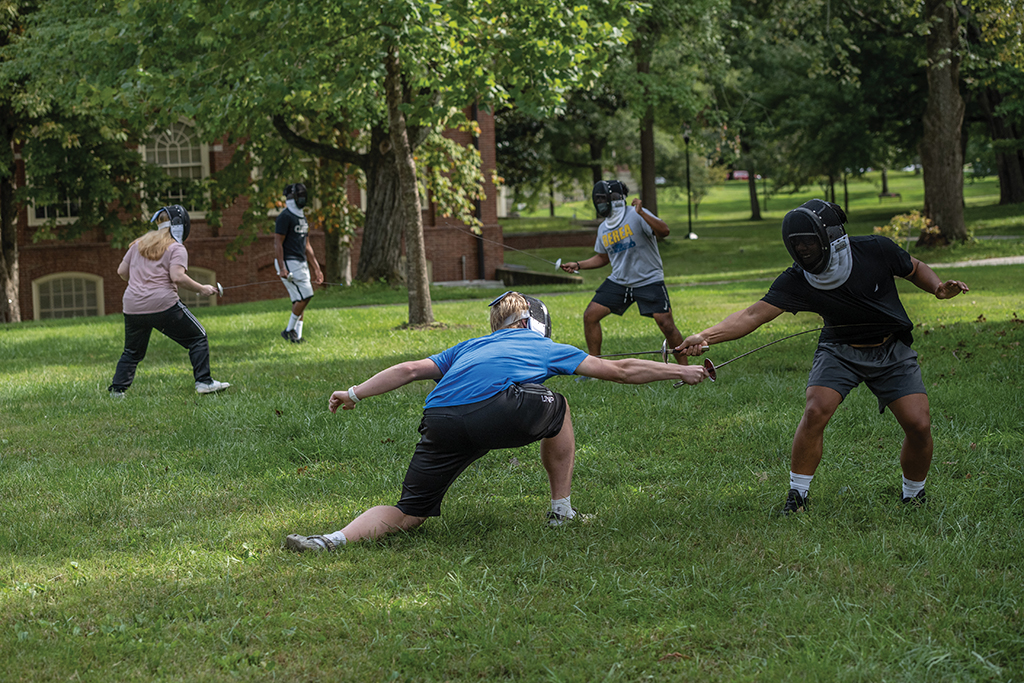
Wellness programs serving the whole campus include opportunities for mindfulness, says Gurtatowski. The app for Weight Watchers classes on campus includes a mindfulness component, and stress management classes also draw on mindfulness approaches. Opportunities for nature rejuvenation include day-long retreats. Students are offered free transportation to the Pinnacles to join weekend community walks led by the Forest Outreach Center. “Emotional wellness is important to help people stay grounded,” Gurtatowski says. Campus Well, an online resource for students, provides an array of articles on mindfulness. Gurtatowski says she hopes employees will feel empowered to develop a practice. “A little goes a long way,” she says. “Five minutes can help.”
A new campus-wide opportunity to nurture spiritual wellness came in spring 2019 with the Campus Christian Center’s building of a labyrinth outside Hutchins Library. Dr. Loretta Reynolds, dean of the chapel, notes that labyrinths have been used as a sacred tool for meditation, prayer and spiritual growth for more than 4000 years. Berea’s labyrinth is open to people of all faiths or no faith. “The experience is about what each individual brings to it,” she said. The labyrinth joins Danforth Chapel and Alumni Building’s All Peoples Prayer Chapel as another “sacred space on campus where people might find a moment of quiet and peace in the middle of our hectic lives,” Reynolds said.
Practicing gratitude
Expressing gratitude is a mindfulness practice that has informed several arenas of work at the College. Since 2014, Dr. Jill Bouma, professor of sociology, has asked students in her sociology of health class to keep gratitude journals as part of their study of spiritual and mental health. “They were the most fun reflections I’ve ever read,” she says. “Students said expressing gratitude made a difference in their lives.”
In fall 2018, Bouma partnered with Judith Weckman, director of Institutional Research and Assessment, to study the effects of expressing gratitude among Berea College employees. About 100 staff members participated in the program, which invited them to express gratitude to co-workers, through speaking or writing, twice a week for three weeks. Students in Bouma’s senior sociology seminar analyzed pre- and post-surveys and interviews. Results showed that participants experienced benefits in daily health and felt a stronger sense of community. Learning-Training Coordinator Mark Nigro included these results in a staff development workshop, “Effectively Expressing Appreciation in Challenging Times,” offered twice in the past two years. “Effectively expressing appreciation benefits the receiver, the giver and the whole workplace environment,” he said.
Weckman agreed. “I’ve tried to practice gratitude every day in my work,” she said. “I say, ‘I appreciate your being here. How can I support you?’ I want to give back what’s proper.”
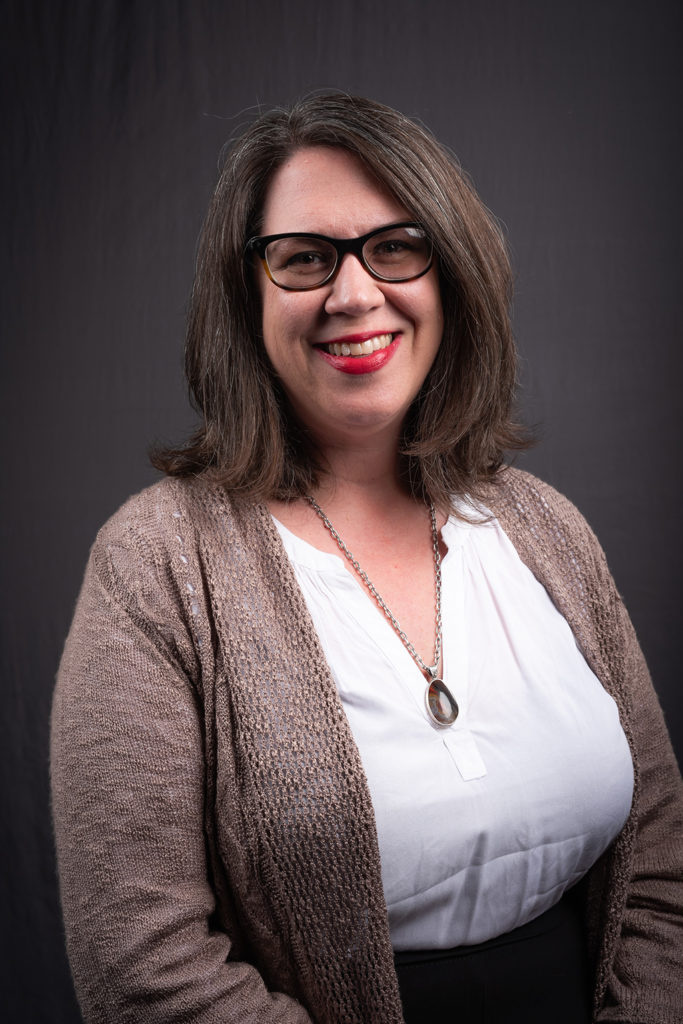
Effects of the gratitude study have extended beyond the college as well. Jennifer Walden, ’19, a sociology and women’s and gender studies graduate now program coordinator at New Opportunity School for Women, teaches participants the benefits of expressing gratitude. “Expressing gratitude is a positive, mindful exercise to guard against the bombardment of negativity we receive daily,” she said. “And when you prioritize self-care, you learn you can better serve others.” Bouma has also experienced personal benefits from expressing gratitude. “Gratitude is the other side of grief,” she said.
The simplicity and brevity of mindfulness practices are a strength, say those who work with them. No special training is needed to offer mindful moments to students, Gurtatowski notes. And the breath is a powerful tool for altering consciousness, Richey says. “It’s a necessity that can make our lives more manageable,” he said.
Woodie agrees. “You can experience moments of serenity and peace regardless of your circumstances,” she said. “Serenity is a choice.”


